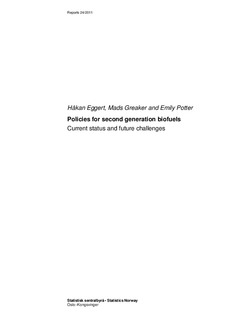| dc.contributor.author | Eggert, Håkan | |
| dc.contributor.author | Greaker, Mads | |
| dc.contributor.author | Potter, Emily | |
| dc.date.accessioned | 2011-10-30T18:56:28Z | |
| dc.date.available | 2011-10-30T18:56:28Z | |
| dc.date.issued | 2011 | |
| dc.identifier.issn | 1892-7513 | |
| dc.identifier.uri | http://hdl.handle.net/11250/181075 | |
| dc.description | When using material from this publication,
Statistics Norway shall be quoted as the source. | no_NO |
| dc.description.abstract | Current state-of-the-art knowledge concludes that green house gas (GHG)
emissions must be controlled and reduced within the next 30-40 years. The
transport sector contributes almost a fifth of the current global emissions, and its
share is likely to increase in the future. The US and a number of European
countries have therefore introduced various support schemes for research and
development (R&D) of low emission fuels that can potentially replace the current
fossil fuels. One such alternative is biofuels. The advantage of biofuels are that it is
easy to introduce into the transport sector. On the other hand, recent research
papers question whether the supply of feedstock is sufficient, and to what extent
biofuels lead to GHG emission reductions. This report reviews the current status of second generation biofuels. Second
generation biofuels are made from cellulose, which according to our survey of the
literature, is in more abundant supply than the first generation biofuels feedstocks.
Furthermore, it seems to have the potential to reduce GHG emissions from the
transport sector without leading to devastating land use changes, which recent
critique has held against first generation biofuels. Given that governments have
decided to support R&D of low emission fuels, we ask the following questions:
• Should second generation biofuels receive R&D support to the same extent as
other low emission fuels like hydrogen?
• How should support schemes for second generation biofuels be designed? | no_NO |
| dc.description.sponsorship | This work was sponsored by the research programs, Environment and Trade in a
World of Interdependence (Entwined), funded by the Foundation for Strategic
Environmental Research (Mistra), Sweden, and Environmentally friendly transport:
How to design policies for sustainable introduction of biofuels, funded by the
Norwegian Research Council (NFR), Norway. | no_NO |
| dc.language.iso | eng | no_NO |
| dc.publisher | Statistics Norway | no_NO |
| dc.relation.ispartofseries | Rapporter;2011/24 | |
| dc.subject | Biodrivstoff | no_NO |
| dc.subject | Utslipp | no_NO |
| dc.subject | Klimagasser | no_NO |
| dc.subject | Emissions | no_NO |
| dc.subject | Biofuels | no_NO |
| dc.title | Policies for second generation biofuels. Current status and future challanges | no_NO |
| dc.type | Report | no_NO |
| dc.subject.nsi | VDP::Social science: 200::Economics: 210::Economics: 212 | no_NO |
| dc.subject.nsi | VDP::Mathematics and natural science: 400::Geosciences: 450 | no_NO |
| dc.source.pagenumber | 35 s. | no_NO |
